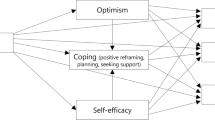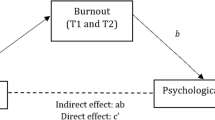Abstract
This study employs a second-order structural equation model to assess the statistical impact of resilience on burnout subscales among undergraduate students from Mexican faculties during the COVID-19 pandemic. An online questionnaire was administered to a nationwide sample of 5557 students enrolled in a higher education institution. The questionnaire demonstrated high reliability, with alpha coefficients exceeding 0.70 for all subscales, and demonstrated construct validity with average variance extracted (AVE) coefficients surpassing 0.50, alongside discriminant validity values exceeding 0.70. Utilizing structural equation models with second-order latent variables through the maximum likelihood method, our study sought to test the research hypothesis. The results indicated that resilience exerted a significant and direct influence on the illusion to study (0.74), explaining approximately 55% of its variance. Additionally, psychological exhaustion (−0.36), indolence (−0.35), and guilt (−0.27) were significantly inversely related, elucidating around 13%, 12%, and 1% of their respective variances. The findings underline the significance of resilience as a pertinent psychosocial factor empowering students to confront the challenges posed by the COVID-19 pandemic. Resilience enhances students’ enthusiasm to study while simultaneously mitigating psychological exhaustion, indolence, and guilt. As defined by the World Health Organization (WHO), burnout emerges as a syndrome resulting from inadequately managed chronic stress. Previous research has demonstrated that depression, psychosomatic disorders, alcohol and tobacco consumption, and obesity stem from the profound feelings of guilt linked to burnout, as outlined in Gil-Monte’s burnout model. Significantly, students in academic contexts often perceive their burnout experiences as indicative of personal inadequacies, leading them to internalize guilt for their perceived underperformance. This self-criticism contributes to a pervasive sense of failure and a marked decline in self-esteem. Moreover, employing Student’s t-tests, this study reveals noteworthy gender-based disparities across all subscales, with the exception of persistence, tenacity, and self-efficacy.


Similar content being viewed by others
Data Availability
The data presented in this study are available upon request
References
Alonzi, S., La Torre, A., & Silverstein, M. W. (2020). The psychological impact of preexisting mental and physical health conditions during the COVID-19 pandemic. Psychological Trauma: Theory, Research, Practice, and Policy, 12(S1), S236–S238. https://doi.org/10.1037/tra0000840
Anand, E. R., Major, C., Pickering, O., & Nelson, M. (2020). Acute pancreatitis in a COVID-19 patient. The British Journal of Surgery, 107(7), e182. https://doi.org/10.1002/bjs.11657
Ayala, J. C., & Manzano, G. (2018). Academic performance of first-year university students: the influence of resilience and engagement. Higher Education Research and Development, 37, 1321–1335. https://doi.org/10.1080/07294360.2018.1502258
Browning, M. H. E. M., Larson, L. R., Sharaievska, I., Rigolon, A., McAnirlin, O., Mullenbach, L., et al. (2021). Psychological impacts from COVID-19 among university students: risk factors across seven states in the United States. PLoS One, 16(4), e0245327. https://doi.org/10.1371/journal.pone.0245327
Connor, K. M., & Davidson, J. R. T. (2003). Development of a new resilience scale: The Connor-Davidson resilience scale (CD-RISC). Depress Anxiety, 18, 76–82. https://doi.org/10.1002/da.10113
Crawford, J., Butler-Henderson, K., Rudolph, J., Malkawi, B., Glowatz, M., Burton, R., et al. (2020). COVID-19: 20 countries’ higher education intra-period digital pedagogy responses. Journal of Applied Learning & Teaching, 3(1), 7–20. https://doi.org/10.37074/jalt.2020.3.1.7
Dong, Z. A., Jiang, M., & Liu, Z. (2023). Locus of control on mental health of college students in Guangxi, China: the chain mediating effect of grit and self-esteem. Educational Research Review, 18(5), 84–92. https://doi.org/10.5897/ERR2023.4315
Esteves, A. (2020). El Impacto Del COVID-19 En El Mercado De Trabajo De Ecuador [The impact of COVID-19 on the labor market in Ecuador]. Mundos Plurales - Revista Latinoamericana De Políticas Y Acción Pública, 7(2), 35–41. https://doi.org/10.17141/mundosplurales.2.2020.4875
Fiorilli, C., Farina, E., Buonomo, I., Costa, S., Romano, L., Larcan, R., & Petrides, K. V. (2020). Trait emotional intelligence and school burnout: the mediating role of resilience and academic anxiety in high school. International Journal of Environmental Research and Public Health, 17(9), 3058. https://doi.org/10.3390/ijerph17093058
García-Rivera, B. R., García-Alcaraz, J. L., Mendoza-Martínez, I. A., Olguin-Tiznado, J. E., García-Alcaráz, P., Aranibar, M. F., & Camargo-Wilson, C. (2021). Influence of COVID-19 pandemic uncertainty in negative emotional states and resilience as mediators against suicide ideation, drug addiction and alcoholism. International Journal of Environmental Research and Public Health, 18(24), 12891. https://doi.org/10.3390/ijerph182412891
Gil-Monte, P. R., & Noyola Cortés, V. S. (2011). Estructura factorial del Cuestionario para la Evaluación del Síndrome de Quemarse por el Trabajo en maestros mexicanos de educación primaria. Revista Mexicana de Psicología, 28(1), 75–92 [fecha de Consulta 24 de Octubre de 2023]. Recuperado de:https://www.redalyc.org/articulo.oa?id=243029630007
Gündoğan, S. (2023). The mediating role of psychological resilience in the relationship between quality of school life and school burnout. https://doi.org/10.30831/akukeg.1191874
Hair, J. F., Hult, G. T. M., Ringle, C. M., Sarstedt, M., Danks, N. P., & Ray, S. (2021). An introduction to structural equation modeling. In Partial least squares structural equation modeling (PLS-SEM) using R. Classroom companion: Business. Springer. https://doi.org/10.1007/978-3-030-80519-7_1
Hossain, N. I., Robinson, M. E., Fillingim, R. B., & Bartley, E. J. (2018). Examining the impact of a resilience-based hope intervention on pain-evoked cortisol response. Journal of Undergraduate Research, 19(2) Retrieved from https://ufdc.ufl.edu/UF00091523/00858
Jew, C. L., Green, K. E., & Kroger, J. (1999). Development and validation of a measure of resiliency. Measurement and Evaluation in Counseling and Development, 32(2), 75–98. https://doi.org/10.1080/07481756.1999.12068973
Kebede, M. A., Anbessie, B., & Ayano, G. (2019). Prevalence and predictors of depression and anxiety among medical students in Addis Ababa, Ethiopia. International Journal of Mental Health Systems, 13, 30. https://doi.org/10.1186/s13033-019-0287-6
Kristinsson, K., Gudjonsson, S., & Kristjansdottir, B. (2023). Tough times require tough people: the benefits of grit for reducing employee burnout. International Journal of Environmental Research and Public Health, 20(11), 6024. https://doi.org/10.3390/ijerph20116024
Leontopoulou, S. (2023). Aftermath of the COVID-19 pandemic: resilience and mental health of emerging adult university students. International Journal of Environmental Research and Public Health, 20(20), 6911. https://doi.org/10.3390/ijerph20206911
Li, F., Luo, S., Mu, W., Li, Y., Ye, L., Zheng, X., Xu, B., Ding, Y., Ling, P., Zhou, M., & Chen, X. (2021). Effects of sources of social support and resilience on the mental health of different age groups during the COVID-19 pandemic. BMC Psychiatry, 21(1), 16. https://doi.org/10.1186/s12888-020-03012-1
Parviainen, M., Aunola, K., Torppa, M., et al. (2021). Early antecedents of school burnout in upper secondary education: A five-year longitudinal study. Journal of Youth and Adolescence, 50, 231–245. https://doi.org/10.1007/s10964-020-01331-w
Qin, L.-L., Peng, J., Shu, M.-L., Liao, X.-Y., Gong, H.-J., Luo, B.-A., & Chen, Y.-W. (2023). The Fully Mediating Role of Psychological Resilience between Self-Efficacy and Mental Health: Evidence from the Study of College Students during the COVID-19 Pandemic. Healthcare., 11(3), 420. https://doi.org/10.3390/healthcare11030420
Quintiliani, L., Sisto, A., Vicinanza, F., Curcio, G., & Tambone, V. (2022). Resilience and psychological impact on Italian university students during COVID-19 pandemic. Distance learning and health. Psychology, Health & Medicine, 27(1), 69–80. https://doi.org/10.1080/13548506.2021.1891266
Romano, L., Angelini, G., Consiglio, P., & Fiorilli, C. (2021). Academic resilience and engagement in high school students: the mediating role of perceived teacher emotional support. European Journal of Investigation in Health, Psychology and Education, 11. https://doi.org/10.3390/ejihpe11020025
Russo, C., Zagrean, I., Mangialavori, S., Danioni, F., Cacioppo, M., & Barni, D. (2019). Comportamenti di uso problematico in adolescenza: il ruolo dei valori personali come fattori di protezione e di rischio [Problematic behaviours in adolescence: the role of personal values as protective and risk factors]. Psicologia Sociale, 14(3), 385–404. https://doi.org/10.1482/94941
Salmela-Aro, K., Tang, X., & Upadyaya, K. (2022). Study demands-resources model of student engagement and burnout. In Handbook of Research on Student Engagement (pp. 77–93). https://doi.org/10.1007/978-3-031-07853-8_4
Stroud, I., & Gutman, L. M. (2021 Sep). Longitudinal changes in the mental health of UK young male and female adults during the COVID-19 pandemic. Psychiatry Research, 303, 114074. https://doi.org/10.1016/j.psychres.2021.114074
Sun, S., Goldberg, S. B., Lin, D., et al. (2021). Psychiatric symptoms, risk, and protective factors among university students in quarantine during the COVID-19 pandemic in China. Global Health, 17, 15. https://doi.org/10.1186/s12992-021-00663-x
Tang, X., Upadyaya, K., & Salmela-Aro, K. (2021). School burnout and psychosocial problems among adolescents: Grit as a resilience factor. Journal of Youth and Adolescence, 86, 77–89. https://doi.org/10.1016/j.adolescence.2020.12.002https://www.sciencedirect.com/science/article/pii/S0140197120301962
Travis, D. J., Vazquez, C. E., Spence, R., & Brooks, D. (2021). Faith communities' improvements in readiness to engage in addictions resilience and recovery support programming. Journal of Religion and Health, 60(6), 3931–3948. https://doi.org/10.1007/s10943-021-01235-4
UNESCO (2020). 290 million students stay home due to coronavirus. Available online: https://www.unesco.org/en/articles/290-million-students-out-school-due-covid-19-unesco-releases-first-global-numbers-and-mobilizes (accessed on 12 January 2023)
Ungar, M. (2019). Designing resilience research: using multiple methods to investigate risk exposure, promotive and protective processes, and contextually relevant outcomes for children and youth. Child Abuse & Neglect, 96, 104098. https://doi.org/10.1016/j.chiabu.2019.104098
Urzúa, A., Vera-Villarroel, P., Caqueo-Urízar, A., & Polanco-Carrasco, R. (2020). La Psicología En La Prevención y Manejo Del COVID-19. Aportes Desde La Evidencia Inicial. Ter. Psicológica, 38, 103–118. https://doi.org/10.4067/S0718-48082020000100103 Retrieved October 6, 2023, from https://scielo.conicyt.cl/pdf/terpsicol/v38n1/0718-4808-terpsicol-38-01-0103.pdf
Walburg, V. (2014). Burnout among high school students: a literature review (2014). Children and Youth Services Review, 42, 28–33. https://doi.org/10.1016/j.childyouth.2014.03.020
Yamashita, A., Yoshioka, S., & Yajima, Y. (2021). Resilience and related factors as predictors of relapse risk in patients with substance use disorder: a cross-sectional study. Substance Abuse Treatment, Prevention, and Policy, 16, 40. https://doi.org/10.1186/s13011-021-00377-8
Yuan, G., Xu, W., Liu, Z., & An, Y. (2018). Resilience, posttraumatic stress symptoms, and posttraumatic growth in Chinese adolescents after a tornado: the tole of mediation through perceived social support. The Journal of Nervous and Mental Disease, 206(2), 130–135. https://doi.org/10.1097/NMD.0000000000000778
Zeng, W., Wu, X., Xu, Y., Wu, J., Zeng, Y., Shao, J., Huang, D., & Zhu, Z. (2021). The impact of general self-efficacy on psychological resilience during the COVID-19 pandemic: The mediating role of posttraumatic growth and the moderating role of deliberate rumination. Frontiers in Psychology, 12, 684354. https://doi.org/10.3389/fpsyg.2021.684354
Acknowledgements
We want to thank all the students who willingly participated in this research.
Author information
Authors and Affiliations
Contributions
The authors in this research had the following task: conceptualization, BRG-R and IAMM; formal analysis, BRG-R and JLG-A; investigation, BRG-R; methodology, BRG-R and JLG-A; project administration, BRG-R; supervision, BRG-R; validation, IAMM and JLG-A; writing—original draft, BRG-R; writing review and editing, BRGR and IAMM. All authors have read and agreed to the published version of the manuscript.
Corresponding authors
Ethics declarations
Ethics Approval
The study was conducted according to the guidelines of the Declaration of Helsinki. The final questionnaire was presented to the Ethics and Bioethics Commission of the Universidad Autonoma de Baja California for its evaluation and authorization.
Consent to Participate
Informed consent was obtained from all subjects involved in the study.
Conflicts of Interest
The authors declare no competing interests.
Rights and permissions
Springer Nature or its licensor (e.g. a society or other partner) holds exclusive rights to this article under a publishing agreement with the author(s) or other rightsholder(s); author self-archiving of the accepted manuscript version of this article is solely governed by the terms of such publishing agreement and applicable law.
About this article
Cite this article
Garcia-Rivera, B.R., Mendoza-Martinez, I.A. & García-Alcaráz, J.L. Enhancing Resilience: Analyzing Its Impact with a Second-Order Structural Equation Model on Burnout Among Mexican University Students During COVID-19. ADV RES SCI 5, 175–187 (2024). https://doi.org/10.1007/s42844-023-00118-9
Accepted:
Published:
Issue Date:
DOI: https://doi.org/10.1007/s42844-023-00118-9




